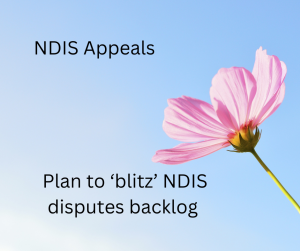
Minister Bill Shorten’s new dispute resolution system aims to ‘blitz’ the number of NDIS appeals currently before the AAT.
Plans are afoot to rehabilitate a ‘broken’ NDIS appeals system. These include the implementation of an Alternative Dispute Resolution (ADR) process to run concurrently and voluntarily with the process currently in place where external reviews of a decision of the NDIA can be referred to the Administrative Appeals Tribunal (AAT). It is hoped that this new ADR process will ‘blitz’ the tremendous backlog of NDIS cases currently with the AAT.
On Tuesday 20 September, the NDIS minister Bill Shorten and NDIA Chief Counsel Matthew Swainson met with members of disability advocacy group, Every Australian Counts. During the session, the minister and Mr Swainson acknowledged and recognised the difficulties currently being experienced by thousands of participants who have been, and continue to be, affected by a ‘frustrating, complex, and ….. in most cases broken’, NDIs appeals system. The minister also acknowledged that their efforts need to consider both future and legacy cases.
To tackle the current backlog, the minister proposes to set up an ‘oversight committee’ to look at the existing cases currently in the AAT. The committee will be chaired by Graeme Innes – former disability discrimination commissioner. This new oversight committee will appoint independent expert reviewers to conduct individual ADR consultations which aim to:
- Be made available to people who have a current, unresolved NDIS matter in the AAT (it is voluntary).
- Run in tandem with the AAT process with the intention is that no-one will ‘lose their place’ in the long AAT queue.
- Be a less formal process that the AAT.
- Discourage the use of external lawyers by the NDIA and encourage the use of advocates for applicants.
- Promote model litigant rules.
- Have up to 2,000 cases referred to this process by Christmas.
- Limit the time this body has to deal with these matters to 1 month.
- If participants require assistance there will be a 1800 number manned by advocates – who will help provide, for example, resources for reports.
Ultimately, Mr Shorten stated that what is required is a “clearer, less adversarial, more efficient process … “, and that this ADR process is a ‘pilot’ for the time being.
The ‘future’ of the appeals process was only touched on however, the minister and Mr Swainson acknowledged:
- To avoid disputes in the first place, there should be a better initial planning process.
- There should be greater transparency as to what participants can and can’t claim and in the internal review process.
- There should be better training of planners and NDIA staff.
- Going forward, there needs to be participant-centred contact arrangements.
- Bill Shorten wants to see planners dealing with participants to build a plan (this one is very exciting!)
- Clearer guidelines about the use of precedents.
Let’s hope this is a portent of better things to come in dealing with NDIS appeals!
If you need help approaching the AAT or with your current AAT matter, contact Lara Legal – email bernadette@laralegal.com.au.
